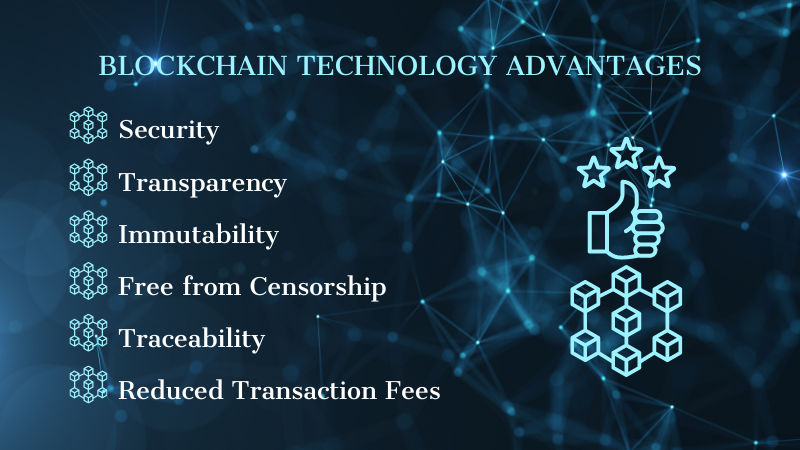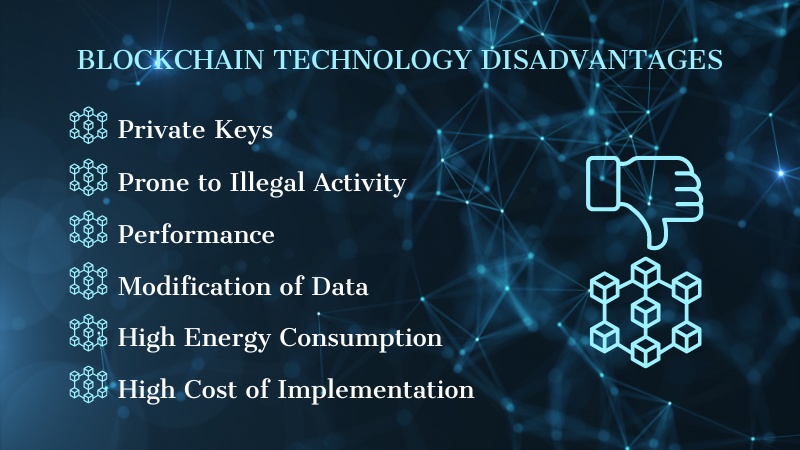We have written a list of the blockchain technology pros and cons to help you understand what it can do. Remember, this adaptable technology has flaws and has some restrictions regarding how it can be used.
Blockchain Technology Advantages
Blockchain technology offers many advantages, and here are some of them.
Security
Blockchain networks offer multiple security levels for their users. Everyone who joins the network receives a distinct identification number that assists in confirming the authenticity of transactions.
Every deal made needs the network participants to confirm it before we can trust and deem it true. Since these transactions cannot be changed, they are protected against dishonest admin or outsider’ attacks. This creates tight security for all trades and transactions in the network.
Transparency
A blockchain system is not centralized, meaning everyone in the network can look at and check the recorded data.
This happens because all transactions are visible either by using an individual node or through tools called blockchain explorers, letting everybody see ongoing transactions on the blockchain as they happen. This creates transparency and builds trust among the public using the network.
Immutability
Blockchain technology provides data permanence, implying that once information is recorded on its network. It cannot be deleted or altered.
This characteristic hinders any changes to the data and makes blockchain an excellent system for keeping records, such as financial transactions where tracking history is important.
This feature is different because old data storage methods don’t have this skill. So, it’s easy for others to change or attack the data.

Free from Censorship
When discussing censorship, the initial thoughts are ‘free speech’ and ‘freedom of the press’. With blockchain, the meaning of censorship is much alike.
It is about stopping actions in the network related to who has permission to access it, what they can do with it, and who has the power to make modifications.
Public blockchains, in particular, don’t have this type of restriction because there are no central bodies or governmental control over them. So, nobody can interfere with how they function.
Traceability
Blockchains are made to have a permanent record that can track where an asset comes from during its whole life.
This is very useful for business areas where people worry about environmental or human rights problems connected with a product or fears of cheating and fake items. Blockchain technology is useful because it can give evidence that allows for tracking records and discovering and solving problems.
Reduced Transaction Fees
Blockchain networks are known for being decentralized which means they can check and confirm transactions without needing an outside third party or middleman, cutting down on the costs of transactions a lot for users.
Blockchain Technology Disadvantages
While blockchain technology offers several advantages, it also has drawbacks that users and businesses must consider.
Private Keys
Blockchains are designed to offer very strong security, yet this same feature can become a weak point. Every user of the blockchain keeps a private key that allows them entry to their assets, money or information, and it needs to be stored with caution.
If you lose the private key, it can cause big problems because if it’s lost, getting it back is rarely possible.
Prone to Illegal Activity
Basic parts of blockchain keep things private and secret. But this can make it easier for the network to be used for forbidden trading and not allowed activities.
A good case to talk about is ‘Silk Road’, which was a hidden website on the internet that worked between 2011 and 2013 for washing money and trading drugs.
Performance
Because blockchain technology performs many more tasks than regular databases, it appears to be much slower.
Blockchains are also considered inefficient, especially the ones that use proof of work consensus mechanisms, because adding a new block can require around 10 minutes.
Also, when every computer or node in the network must keep a copy of each transaction. This creates repeated information.

Modification of Data
The unchangeable nature of information in the blockchain system can be a large problem when changes are needed or errors happen. Changing the code takes a lot of time and costs a lot of money.
High Energy Consumption
A big challenge with this technology is that it uses a lot of energy. Every computer connected to the blockchain must keep an updated record each time there’s a new link added to the chain.
The amount of energy used in each cycle is very large. The Bitcoin network has expanded significantly, and its energy use has increased. The network might use more power today than in Denmark, Ireland, or Nigeria.
High Cost of Implementation
Blockchain acts like two sides of a coin. While it reduces user expenses, the high price companies must pay to use this technology might slow its widespread acceptance.
Companies must make sure they plan and execute well to successfully add this technology into their workflows.
What Is Blockchain Technology?
Blockchain technology is transforming innovation by using decentralized systems that collaborate and share value transparently.
Blockchain technology, introduced by Satoshi Nakamoto in 2008 for Bitcoin, makes the history of any digital asset unchangeable and secure while allowing everyone to see it.
How Blockchain Works?
Cryptocurrencies depend on blockchain technology, which uses a shared record system that tracks all past and current data, such as transactions.
Blockchains are often employed in the creation of a distributed ledger. These ledgers keep records of accounting dealings and balances, similar to how databases hold data.
Distributed ledgers aren’t required to be part of blockchain technology to count as ‘distributed’; they simply need sharing across different computers in the network.
Several other characteristics distinguish blockchain technology from the usual databases managed by financial institutions, such as records that cannot be altered and intelligent agreements.
Irreversible transactions
Every trade the network nodes put on the blockchain stays there forever. After the computer network checks the information and puts it in as a new block, that record cannot change anymore. And this serves much more important purposes beyond simply keeping the system running.
Transactions cannot be reversed, they stay on the record forever, and everybody can view them. It is difficult and complex for a single participant to alter or make false entries in the recorded data on a ledger.
To alter the information in the ledger and make this changed version the main one, a person must change their copy of the records and modify more than half of all other users’ copies.
So, because it is hard to change these permanent records, hacking into this system becomes very challenging.
Smart contracts
A smart contract is a contract that runs by itself. The agreement’s details are put straight into blockchain code lines. When the conditions match up, it carries out its terms automatically.
For the working of blockchain, it is like this: when there happens a new action such as buying bitcoin or ether, this information goes to many computers. These computers do math problems to check if the transaction is good.
Should the transaction not be accepted, it does not appear on the blockchain. However, once confirmed, nodes incorporate this data as a fresh block in the ledger and link it with previous blocks (and subsequent ones) to preserve the security of the chain. Once this step is done, the transaction will be complete.
Conclusion of Blockchain Technology Advantages and Disadvantages
Even with its problems, blockchain has shown that it is a technology with great importance and special advantages.
To incorporate this technology into a company and gain advantages like reduced expenses, precise data, and secure transactions – leaders need to understand the good and bad points while making sure of careful planning and doing it correctly.
Frequently Asked Questions – Blockchain Technology Pros and Cons
What is blockchain technology❓
Blockchain technology is a system that spreads out data across many computers, making it very secure and hard to change once information is added.
What are the advantages of blockchain technology❓
The main advantages include increased security, transparency, fast transactions, and the elimination of the need for a central authority.
What are the challenges of blockchain technology❓
Some challenges include its complex nature, high energy consumption, difficulty in scaling up, and the uncertainty of government regulations.
Can blockchain be used in different industries❓
Yes, blockchain can be used in various sectors, not just for digital currencies, but also in healthcare, real estate, supply chain management, and more.
Is blockchain technology secure❓
Yes, blockchain is generally very secure due to its cryptographic and decentralized nature, but it’s not immune to all types of risks, especially if there are flaws in how it’s implemented.
